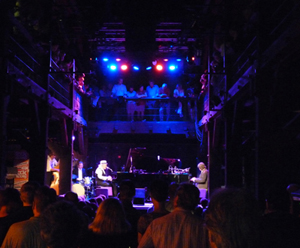The Fabrik
The Fabrik (German for "factory") was founded in 1971 by a private initiative as the first cultural center in Germany. The building, situated at the Barnerstrasse in Hamburg-Altona, is a former ammunition factory, about 150 years old. Some of the old cranes and structures were preserved, such as the two surrounding galleries, which allow to view the stage and the activities in the hall.
The Fabrik combines diverse projects and functions under its roof: social work for children and young people, paedagogics and politics, theatre and concert performances of all kind. It’s the goal of the Fabrik, to open the access to art and culture for everybody and make it available on one hand, on the other, to provide a day-time meeting point for children and juveniles from Altona and around. There, they can do their homework, also with assistance, and they can talk about problems. It’s also possible to participate in courses of art and photography (also for grown-ups) and like this to enhance their self-understanding as well as the understanding for art in general.
In 1977, the Fabrik burned down completely, but was rebuilt and re-opened in 1979.
The evening programs offer lectures, concerts, parties, theatre and much more. Many international artists have performed here, such as Meat Loaf, Kris Kristoffersen, Miles Davis, Chris de Burgh, Vince Weber, Axel Zwingenberger, Yothu Yindi and many more.
The Fabrik is financed by the revenues from the events and the gastronomy, and by the support from the office of the Senator of Culture of the Freie und Hansestadt Hamburg (city and state). For its new understanding of culture, „Kultur fuer alle“ (culture for all), the Fabrik was awarded as a role model by the German federal government. It broke ground for many similar projects in Germany and abroad.
Since 2006, in the wake of its 35-years’ anniversary, the Fabrik Stiftung (Fabrik foundation) was established. Turning the Fabrik into a foundation secures and supports the cultural offers of the Fabrik, but particularly the charge-free cultural program for children and juveniles.
If you are interested to support the Fabrik, you’ll find all important informations at the following link:




